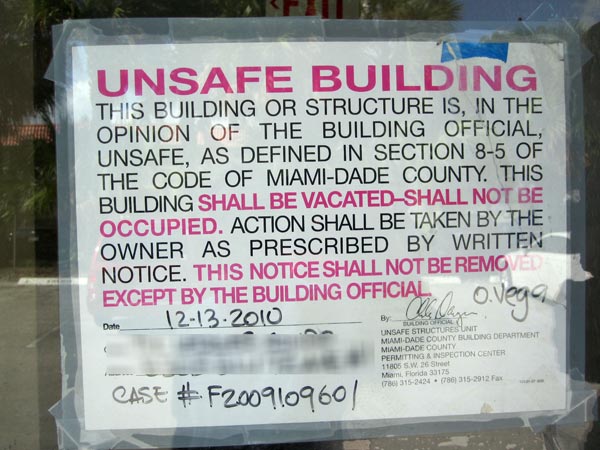Living in the least affordable city in the state with the least affordable housing market in the country will squash any illusions you have about landlords and local government looking out for the people.
I live in a duplex where I can see the Miami River, watching yachts and party boats glide by any day of the week on their way to do what I can only imagine is some shit I could never afford. When I step into my apartment, the floor groans as my weight irritates the bowing floor panels. Every step is a question to my safety that I have grown desensitized to because I don’t really have a choice. Cracks in the wall and the baseboards are telling me there was a significant foundational shift in the building, but my landlord is ensuring me that an inspector (who he refuses to give me the contact information for) cleared the building for habitability, so here I am.
What are my options?
Well I can’t afford to move. No amount of combing through zillow, apartments.com, or trulia will yield an affordable apartment. Rising rents have left me in the last affordable place in Miami. If I move, I lose the only place I can afford. What’s more, most landlords require 3 months rent upfront.
I could call code enforcement. They will likely come out, see how fucked up and unstable the floor is, and tell me to vacate immediately. I could get relocation assistance from the landlord which would help with the initial move, but then what? Where would I move to that would be just as affordable as this place? If I’m thrust into an ever-inflating housing market, what good will 3 months of rent do if the long term result is I can no longer afford the monthly rent?
Technically I can legally withhold rent, but most of the time that ends up in an eviction anyway. The process for legally withholding rent is so specific that one missed technicality could nullify your whole case. Yet, if a landlord makes a procedural mistake, for instance, they can still salvage their case and carry on with their eviction.
Why the disparity? The laws in this state are so clearly written in favor of the landlord; but why do the courts favor the interests of the landlord anyway?
Let’s define what even are the interests of the landlord. Despite what they may claim, they are not benevolent “providers of housing” yielding only a meager profit for all the work they do ignoring calls for repairs, painting over roaches, and stealing your security deposit. Their interest is simply to rake in the most money by charging the highest amount possible while spending the lowest amount possible. Wielding their access to capital, they invest in an inelastic product for which there will always be a demand, thereby guaranteeing them an inexhaustible stream of income. People will always need housing, so this is a relatively safe investment. Controlling access to a basic necessity of life, they are in an advantageous position compared to the person seeking housing. But landlords did not build the apartment buildings they rent out; they did not renovate and repair them. Most of the time they simply moved the money around to make other people do those things. In short, a landlords interests are to reap where they never sowed. If this happened just on an individual level, it might just be an annoyance to navigate around. But, the structure of local, state and federal housing policy in general is built to serve their profit incentive.
This exposes the reality of bourgeois democracy – it is in place to “defend the freedom” of private profit and property. As we know, politicians can simply be paid to act in the interests of their donors. Who would have the most buying power? The people who are already accumulating massive profits from their housing investments. It seems they have a little more democracy than the rest of us. And what of the call coming from inside the house? The courts favoring of landlords comes as no surprise when you see that property owners are the ones making policies. And yet, we cannot say that the interests of the landlords and the courts overlap simply because many legislatures are also landlords. This problem would not be fixed if we simply “got the right people” in office, nor would anti-lobbying laws solve the issue. Democracy and freedom under capitalism is the freedom for the capitalist class to extract value from the dominated and exploited classes. Reinforcing the mechanisms used by exploiting class to continue its exploitation is the premise upon which bourgeois democracy is founded. The government may proclaim itself to be a mediator that stands above the interests of these two opposing classes and is thus, a fair and neutral party which can resolve their conflicts. Yet, if this structure allows this fundamental exploitation to occur in the first place, it cannot possibly be neutral. The first conflict which requires resolution is the conflict in which a class which owns the land, the resources, and the means of production can withhold these necessities from being used by the class which does not own these things unless they pay for its use with their labor. This conflict, however, is not called into question by our “neutral” mediator, but taken as a given. Thus, in allowing this class to already win this initial conflict, the state clearly shows which side it serves at its core.
The capitalist class has already made the necessary moves to set up society according to their own interests. At this point their collective forms of organization exist to address conflicts internal to them – like lobbying for tax breaks or deregulation. Make no mistake, they do not let their internal conflicts stop them from squashing any push for power from the masses. Take for example the FL House and Senate bills to strip the power of local tenants bills of rights voted for in multiple counties last year.
So what about tenants’ forms of organization?
If the state is already set up against our interests, then we need independent forms of organization. While we can consider it a temporary victory to have our rights enshrined within bourgeois democracy, this victory is doomed to temporality while the state still serves interests diametrically opposed to ours (see again the now-defunct tenant’s bill of rights that was so hard fought). We don’t need to look far beyond our own county to see how commissioners will casually break laws protecting vulnerable groups to serve real estate interests. They don’t even have to overturn these laws! They can just choose not to enforce them. Our salvation doesn’t lie in reforming a system set up against us, and it certainly doesn’t lie in “benevolent” politicians who, against all odds, try to make piecemeal reforms for the people. Our salvation lies in us; in our collective, independent organization. We cannot wield the bourgeois state, a weapon that was made to be wielded against us. We must construct our own weapon that we can wield against the capitalist class.
The strength and construction of that weapon will be determined by the political unity that we can build among each other. The moment is ripe and tensions are high – I would love to see a movement of people out in the streets to scare the shit out of my landlord! All of our landlords! But when we meet in the streets, what are we going to fight for together? Do we understand what each other want, need and are capable of? It seems we have been purposefully isolated from each other, even made to believe that we have “enemies” next door that are a bigger problem than the enemies in control of our homes, workplaces and governments. We have to come together and engage in shared practices to get to know each other and collectively construct an understanding of our shared moment for what it is – class struggle.
What do those shared practices look like? Well that will depend on where you are! For example, my neighborhood has a huge yacht problem – they’re like rats. Maybe we set up giant yacht traps with sacks of gold right in the middle. Your neighborhood probably has different problems – start talking to the people around you to figure out what they are and what independent collective solutions can be built to address them.
You are not alone! We are trying to do the same thing not only in our neighborhoods, but our workplaces, schools and social groups. Reach out and we can build a network of strong, independent problem solvers who won’t be fooled by our enemies any longer!




